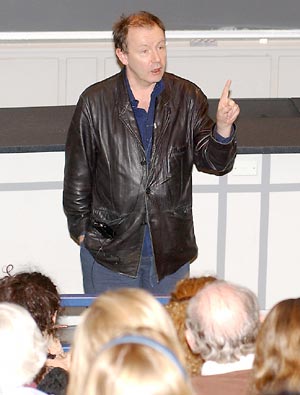The soon-to-be artistic director of the Royal Shakespeare Company (RSC) promises a unique experience when the troupe performs the U.S. premiere of Salman Rushdie’s “Midnight’s Children” in March. Michael Boyd says the production will feature an approach in which the narrator speaks to the audience. It also will move between live action and film in what Boyd calls a “dialogue between screen and stage.”
“They’re not trying to make it a regular play and I’m glad of that,” says Boyd of Rushdie and RSC’s team of Simon Reade and Tim Supple, who are adapting the work for the stage. Boyd was on campus last week to promote the second RSC residency at U-M.

During the residency, which is jointly sponsored by U-M and the University Musical Society, RSC also will perform Shakespeare’s “The Merry Wives of Windsor” and “Coriolanus,” and the company will offer many educational opportunities for the community.
Educational outreach has been an important part of RSC’s history in Great Britain, Boyd says, so it is natural that during this year’s residency the company has scheduled more opportunities to interact with children in area classrooms. “One of the most glorious things RSC does in Britain is work with the schools,” says Boyd, who acknowledges that the first encounter most students have with Shakespeare is “grim and sterile.” He says the RSC works to bring the playwright to life in fresh and exciting ways in order to capture young audiences.
To that end, Boyd is even working on a video game version of “The Tempest” with the Massachusetts Institute of Technology. He says the project is in the early stages, but he is toying with the idea of making the play itself a “cheat book” — a type of helpful booklet or magazine avid video game players use to find clues that can help them win the game or get special bonuses, such as invisibility or extra lives. Children would have to read the actual play to find a key phrase that becomes the password to success in the game, he says.
Boyd, who officially takes the role of artistic director in April, has been heralded by RSC insiders and the British press as the right person to rejuvenate the theatrical company. Boyd says his vision for the RSC is one that will “be continually evolving and that will change with time.” But one thing he knows he wants to do is allow actors more time to work on a production.
“In 2005, I would love it if Michigan could see a Shakespeare production that we have worked on for four months instead of the usual six weeks. I would love Ann Arbor to see one of our no-holds-barred experimental Shakespeare productions that will be prepared in just over two months, that will have no responsibility to play a repertoire for a long time.
“It is possible, I believe, for us to structure ourselves in such a way that we can devote much more time to the work, allowing us to learn and make art at the same time,” Boyd says.
He also would like to entice some veteran RSC actors back into the company, including Ian Richardson, Vanessa Redgrave and Dame Judi Dench.
Boyd knows what he does not want for the future of the company. “I’m not interested in the RSC being a pontificating center of expertise anymore,” he says. “I’m interested in it being an explorer in the vanguard of theatrical practice, with Shakespeare as its guide.”
Boyd already is thinking ahead to possible content for a third residency. During his visit he had a conversation with President Mary Sue Coleman about perhaps doing a work on Post-Traumatic Stress Disorder — an area he describes as “plowing some new territory.”
Boyd most recently served as associate director of the RSC. Last year, he won Britain’s prestigious Laurence Oliver Award for Best Director of the 1,2,3 Henry VI and Richard III tetralogy, which were featured works during the first U-M residency.
For information on the RSC residency or the performances, visit http://www.umich.edu/pres/rsc.

